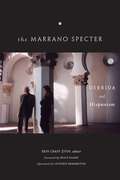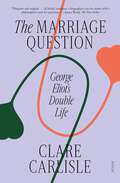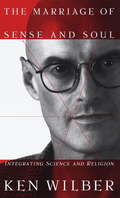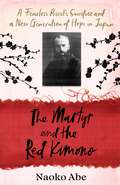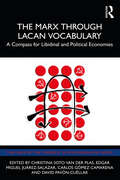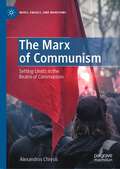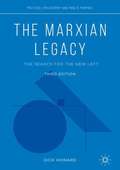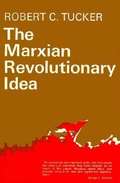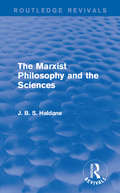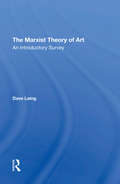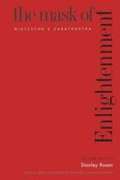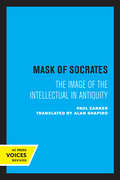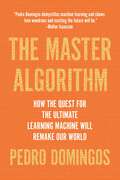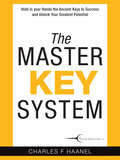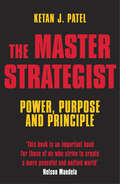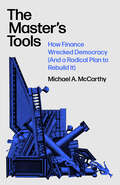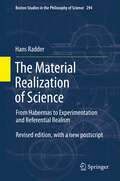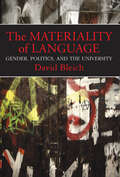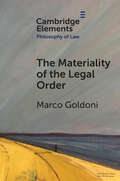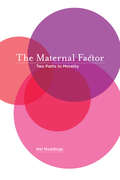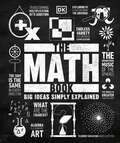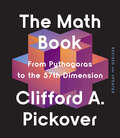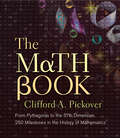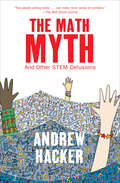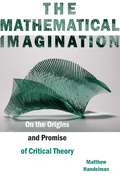- Table View
- List View
The Marrano Specter: Derrida and Hispanism
by Erin Graff ZivinThe Marrano Specter pursues the reciprocal influence between Jacques Derrida and Hispanism. On the one hand, Derrida’s work has engendered a robust conversation among philosophers and critics in Spain and Latin America, where his work circulates in excellent translation, and where many of the terms and problems he addresses take on a distinctive meaning: nationalism and cosmopolitanism; spectrality and hauntology; the relation of subjectivity and truth; the university; disciplinarity; institutionality.Perhaps more remarkably, the influence is in a profound sense reciprocal: across his writings, Derrida grapples with the theme of marranismo, the phenomenon of Sephardic crypto-Judaism. Derrida’s marranismo is a means of taking apart traditional accounts of identity; a way for Derrida to reflect on the status of the secret; a philosophical nexus where language, nationalism, and truth-telling meet and clash in productive ways; and a way of elaborating a critique of modern biopolitics. It is much more than a simple marker of his work’s Hispanic identity, but it is also, and irreducibly, that.The essays collected in The Marrano Specter cut across the grain of traditional Hispanism, but also of the humanistic disciplines broadly conceived. Their vantage point—the theoretical, philosophically inflected critique of disciplinary practices—poses uncomfortable, often unfamiliar questions for both hispanophone studies and the broader theoretical humanities.
The Marriage Question: George Eliot's Double Life
by Clare CarlisleNamed one of the ten Best Reviewed Nonfiction Books of 2023 by Literary Hub A startling new portrait of George Eliot, the beloved novelist and a rare philosophical mind who explored the complexities of marriage.In her mid-thirties, Marian Evans transformed herself into George Eliot—an author celebrated for her genius as soon as she published her debut novel. During those years she also found her life partner, George Lewes—writer, philosopher, and married father of three. After “eloping” to Berlin in 1854, they lived together for twenty-four years: Eliot asked people to call her "Mrs Lewes" and dedicated each novel to her "Husband." Though they could not legally marry, she felt herself initiated into the "great experience" of marriage—"this double life, which helps me to feel and think with double strength." The relationship scandalized her contemporaries yet she grew immeasurably within it. Living at once inside and outside marriage, Eliot could experience this form of life—so familiar yet also so perplexing—from both sides. In The Marriage Question, Clare Carlisle reveals Eliot to be not only a great artist but also a brilliant philosopher who probes the tensions and complexities of a shared life. Through the immense ambition and dark marriage plots of her novels, we see Eliot wrestling—in art and in life—with themes of desire and sacrifice, motherhood and creativity, trust and disillusion, destiny and chance. Carlisle's searching new biography explores how marriage questions grow and change, and joins Eliot in her struggle to marry thought and feeling.Includes black-and-white images
The Marriage of Sense and Soul: Integrating Science and Religion
by Ken WilberThere is arguably no more critical and pressing topic than the relation of science and religion in the modern world. Science has given us the methods for discovering truth, while religion remains the single greatest force for generating meaning. Yet the two are seen as mutually exclusive, with wrenching consequences for humanity. In The Marriage of Sense and Soul, one of today's most important philosophers brilliantly articulates how we might begin to think about science and religion in ways that allow for their reconciliation and union, on terms that will be acceptable to both camps. Ken Wilber is widely acclaimed as the foremost thinker in integrating Western psychology and the Eastern spiritual traditions. His many books have reached across disciplines and synthesized the teachings of religion, psychology, physics, mysticism, sociology, and anthropology, earning him a devoted international following. The Marriage of Sense and Soul is his most accessible work yet, aimed at guiding a general audience to the mutual accord between the spiritual, subjective world of ancient wisdom and the objective, empirical world of modern knowledge. Wilber clearly and succinctly explores the schism between science and religion, and the impact of this "philosophical Cold War" on the fate of humanity. He systematically reviews previous attempts at integration, explaining why romantic, idealistic, and postmodern theories failed. And he demonstrates how science is compatible with certain deep features common to all of the world's major religious traditions. In pointing the way to a union between truth and meaning, Ken Wilber has created an elegant and accessible book that is breathtaking in its scope.From the Hardcover edition.
The Martyr and the Red Kimono: A Fearless Priest’s Sacrifice and A New Generation of Hope in Japan
by Naoko AbeThe remarkable true story of Saint Maximilian Kolbe, and the two men in war-torn Japan whose lives he changed forever.On the 14th of August 1941, a Polish priest named Maximilian Maria Kolbe was murdered in Auschwitz.Kolbe's life had been remarkable. Fiercely intelligent and driven, he founded a movement of Catholicism and spent several years in Nagasaki, ministering to the 'hidden Christians' who had emerged after centuries of oppression. A Polish nationalist as well as a priest, he gave sanctuary to fleeing refugees and ran Poland's largest publishing operation, drawing the wrath of the Nazis. His death was no less remarkable: he volunteered to die, saving the life of a fellow prisoner.It was an act that profoundly transformed the lives of two Japanese men. Tomei Ozaki was just seventeen when the US dropped an atomic bomb on Nagasaki, destroying his home and his family. Masatoshi Asari worked on a farm in Hokkaido during the war and was haunted by the inhumane treatment of prisoners in a nearby camp. Forged in the crucible of an unforgiving war, both men drew inspiration from Kolbe's sacrifice, dedicating their lives to humanity and justice. Ozaki followed in his footsteps and became a friar. Asari created cherry trees as peace offerings.In The Martyr and the Red Kimono, award-winning author Naoko Abe weaves together a deeply moving and inspirational true story of resistance, sacrifice, guilt and atonement.
The Marx Through Lacan Vocabulary: A Compass for Libidinal and Political Economies
by Christina Soto van der Plas, Edgar Miguel Juárez-Salazar, Carlos Gómez Camarena and David Pavón-CuéllarThis text explores a set of key concepts in Marxist theory as developed and read by Lacan, demonstrating links and connections between Marxist thought and Lacanian practice. The book examines the complexity of these encounters through the structure of a comprehensive vocabulary which covers diverse areas, from capitalism and communism to history, ideology, politics, work, and family. Offering new perspectives on these concepts in psychoanalysis, as well as in the fields of political and critical theory, the book brings together contributions from a range of international experts to demonstrate the dynamic relationship between Marx and Lacan, as well as illuminating "untranslatable points" which may offer productive tension between the two. The entries trace the trajectory of Lacan’s appropriation of Marx’s concepts and analyses how they were questioned, criticized, and reworked by Lacan, accounting for the wide reach of two thinkers and worlds in constant homology. Each entry also discusses psychoanalytic debates relating to the concept and seeks to refine the clinical scope of Marx’s work, demonstrating its impact on the social and individual dimensions of Lacanian clinical practice. With a practical and structured approach, The Marx through Lacan Vocabulary will appeal to psychoanalysts and researchers in a range of fields, including political science, cultural studies, and philosophy.
The Marx of Communism: Setting Limits in the Realm of Communism (Marx, Engels, and Marxisms)
by Alexandros ChrysisFollowing Marx’s own itinerary from Paris to London, from politics to the critique of political economy, The Marx of Communism delves into a creatively unfolding international debate on the democracy-communism relation, while supporting a 21st century communism as a social alternative to capitalism. Taking into consideration Marx’s analysis of communism both as a movement and a social formation, this study focuses on the dialectics of transition from capitalism to communism. Dealing with communism as the outcome of a long-term cultural and political process, the author defends Marxian communism as the open-ended constitution of a self-governed demos, whose citizens create their own way of life on the ground of a stateless and classless society. From this point of view, the end of the state does not mean the end, but the revival of politics in terms of a communist bios. Reshaping their collective and personal values and setting limits to the production/technology dynamics of their economy, this book argues, the citizens of a communist polis form a promising antithesis to the private individuals of a capitalist society.
The Marxian Legacy: The Search for the New Left (Political Philosophy and Public Purpose)
by Dick HowardThe Marxian Legacy, first published in 1977 and released in a second edition in 1988, was and remains distinct in its view of Marxian theory as 'critique, ' aware of its own origins and limitations and self-conscious about its own historical rootedness in changing social and political conditions. This new and fully revised third edition retains the original synthesis of the divergent traditions of German, critical, and French Marxisms into a living Marxian legacy that changes and reconceptualizes itself, while also providing a new critical introduction and concluding chapter. Such a re-evaluation of the Marxian legacy, which was urgent in the 1970s when the United States was caught up in imperial wars and domestic as well as racial conflict, remains relevant today when—as was the case nearly half a century ago—Marx’s legacy has largely been forgotten and yet remains as a symbol of radical thinking that could inspire the new movements. The Marxian Legacy, 3rd Edition retains the freshness of discovery from those times while fully updating the text for our contemporary moment, and adding two features: a philosophical closure; and, a perspective on what was possible then, and what remains to be done today.
The Marxian Revolutionary Idea
by Robert C. Tucker"In his parting word about Marx at Highgate Cemetery, Engels characterized his friend as 'before all else a revolutionist.' This was a true summation of Marx both as a man of action and as a thinker. For as a theorist Marx was before all else a theorist of revolution. The revolutionary idea was the keystone of his theoretical structure. Marxism, as he fashioned it with the assistance of Engels, was in its essence a theory and program of revolution." In this volume Robert C. Tucker looks critically at the later writings of Marx and Engels, not only as political theory but as the ideology for political revolution. From the vantage point established in his earlier work that there is a continuity underlying Marx's writing from the newly discovered manuscripts of 1844 to the mature work, Capital--Professor Tucker examines Marx as a social, moral, and political theorist, and a theorist of modernization. "The Marxian Revolutionary Idea" is followed, in thought and application, through infancy to maturity, in success and failure, and finally as it has been transformed by modern socialism.
The Marxist Philosophy and the Sciences (Routledge Revivals)
by J. B. HaldaneThis book, first published in 1938, is based upon the Muirhead lectures on political philosophy delivered in the University of Birmingham in January and February of 1938. This title was intended to be of interest to students and scientific workers in the belief that Marxism will prove valuable to them in their scientific work, as well as to a wider audience.
The Marxist Theory Of Art: An Introductory Survey
by Dave LaingThis book is intended as a structured presentation of the major ideas of the most important trends of thought in the Marxist theory of art and is constructed as a map of the field of Marxist aesthetics.
The Mask Of Enlightenment: Nietzsche's Zarathustra
by Stanley RosenThis landmark study is a detailed textual and thematic analysis of one of Nietzsche’s most important but least understood works. Stanley Rosen argues that in Zarathustra Nietzsche lays the groundwork for philosophical and political revolution, proposing a change in humanity’s condition that would be achieved by eliminating the decadent existing race and breeding a new race to take its place. Rosen discusses Nietzsche’s systematically duplicitous rhetoric of esoteric messages in Zarathustra, and he places the book in the contexts of Greek, Christian, Enlightenment, and postmodernist thought.
The Mask of Socrates: The Image of the Intellectual in Antiquity (Sather Classical Lectures #59)
by Paul ZankerThis richly illustrated work provides a new and deeper perspective on the interaction of visual representation and classical culture from the fifth century B.C. to the fourth century A.D. Drawing on a variety of source materials, including Greco-Roman literature, historiography, and philosophy, coupled with artistic renderings, Paul Zanker forges the first comprehensive history of the visual representation of Greek and Roman intellectuals. He takes the reader from the earliest visual images of Socrates and Plato to the figures of Christ, the Apostles, and contemporaneous pagan and civic dignitaries. Through his interpretations of the postures, gestures, facial expressions, and stylistic changes of particular pieces, we come to know these great poets and philosophers through all of their various personas—the prophetic wise man, the virtuous democratic citizen, or the self-absorbed bon vivant. Zanker's analysis of how the iconography of influential thinkers and writers changed demonstrates the rise and fall of trends and the movement of schools of thought and belief, each successively embodying the most valued characteristics of the period and culture. This title is part of UC Press's Voices Revived program, which commemorates University of California Press’s mission to seek out and cultivate the brightest minds and give them voice, reach, and impact. Drawing on a backlist dating to 1893, Voices Revived makes high-quality, peer-reviewed scholarship accessible once again using print-on-demand technology. This title was originally published in 1995.
The Master Algorithm: How the Quest for the Ultimate Learning Machine Will Remake Our World
by Pedro DomingosAlgorithms increasingly run our lives. They find books, movies, jobs, and dates for us, manage our investments, and discover new drugs. More and more, these algorithms work by learning from the trails of data we leave in our newly digital world. Like curious children, they observe us, imitate, and experiment. And in the world’s top research labs and universities, the race is on to invent the ultimate learning algorithm: one capable of discovering any knowledge from data, and doing anything we want, before we even ask. Machine learning is the automation of discovery--the scientific method on steroids--that enables intelligent robots and computers to program themselves. No field of science today is more important yet more shrouded in mystery. Pedro Domingos, one of the field’s leading lights, lifts the veil for the first time to give us a peek inside the learning machines that power Google, Amazon, and your smartphone. He charts a course through machine learning’s five major schools of thought, showing how they turn ideas from neuroscience, evolution, psychology, physics, and statistics into algorithms ready to serve you. Step by step, he assembles a blueprint for the future universal learner--the Master Algorithm--and discusses what it means for you, and for the future of business, science, and society. If data-ism is today’s rising philosophy, this book will be its bible. The quest for universal learning is one of the most significant, fascinating, and revolutionary intellectual developments of all time. A groundbreaking book, The Master Algorithm is the essential guide for anyone and everyone wanting to understand not just how the revolution will happen, but how to be at its forefront.
The Master Key System
by Charles F. Haanel Katherine HurstThis is no ordinary book.The Master Key System is a phenomenon of its time; known as the inspiration behind many of today's self-help teachings, this book can teach you the secrets to using the universal laws, to better align with the universe and begin creating a life you can love.Make no mistake; this book is not to be approached as you would a novel, but as an on-going course. The road to success is nothing but a journey, after all.The powerful lessons in this book are delivered through 24 weekly parts. Easy-to-digest, concise and packed with practical exercises for easy absorption, this book provides the perfect companion for anyone looking to achieve big life transformation.Want to be successful? To earn more money? To fall in love? Or to enjoy improved health? Then The Master Key System is for you!So - are you ready to tap into the hidden powers within you, to become conscious creator of your reality? Let The Master Key System show you how...
The Master Strategist: Power, Purpose and Principle in Action
by Ketan J PatelSince the turn of the century, we have seen hopes of a new era of peace shattered by the 9/11 attack on the US. We have witnessed the US become embroiled in a divisive and seemingly unwinnable war in Iraq.. We have looked on as new nuclear rivalries have sprung up with Iran and North Korea. We have also seen Europe struggle to define its place in the New World Order. And we have observed the balance of world focus shift towards China and India as they have continued their unprecedented economic rise.What is the significance of all of this? Are these random events or is there an underlying pattern? What is required of leaders and individuals to propel the world in a more positive direction? The Master Strategist provides the means to decipher these changes, offering unique insights into the issues and patterns that are defining the future, and pointing the way to strategies for a freer and more peaceful and prosperous world.
The Master's Tools: How Finance Wrecked Democracy (And a Radical Plan to Rebuild It)
by Michael McCarthyFinance serves the rich and powerful. We need to democratize it.Why is democracy so broken and how might it be fixed? In The Master's Tools, award-winning author Michael A. McCarthy argues the answer can be found in the flows of credit and investment bound up with finance capital.Today, finance guides and constrains our politics, but there is no reason why this must be so. In this groundbreaking work, McCarthy develops a political and social theory of institutional transformation rooted in the interconnectedness of finance and democracy.Inspired by ancient Athens, where small groups chosen by lottery were used to ensure democratic participation, he shows how democracy and working-class power can be strengthened by introducing new forms of financial governance, focusing on the inclusion of historically excluded groups.His proposals for democratic financial institutions point the way to imbuing finance with a socio-environmental purpose and the funding of a just green transition, social housing, and other necessary public goods. And these financial institutions might be the first step toward a whole new kind of economy.
The Material Realization of Science
by Hans RadderThis book develops a conception of science as a multi-dimensional practice, which includes experimental action and production, conceptual-theoretical interpretation, and formal-mathematical work. On this basis, it addresses the topical issue of scientific realism and expounds a detailed, referentially realist account of the natural sciences. This account is shown to be compatible with the frequent occurrence of conceptual discontinuities in the historical development of the sciences. Referential realism exploits several fruitful ideas of Jürgen Habermas, especially his distinction between objectivity and truth; it builds on a in-depth analysis of scientific experiments, including their material realization; and it is developed through an extensive case study in the history and philosophy of quantum mechanics. The new postscript explains how the book relates to several important issues in recent philosophy of science and science studies. "I highly recommend this book. Radder is probably the first philosopher of science to make productive epistemological use of the notion of 'experimental system'. The postscript is most valuable since it connects his work not only to the topical debates in philosophy of science, but also to history of science and science studies." Hans-Jörg Rheinberger, Max Planck Institute for the History of Science, Berlin About the first edition: "The debate on realism has recently become rather stale by repetition, but Radder introduces original insights and has written a lively and well-argued contribution to it. The book is to be recommended also as a clear introduction to the complex of relevant issues." Mary Hesse, University of Cambridge "Radder presents an ingenious approach to the issue of scientific realism and conceptual discontinuity. I believe his idea that conceptual discontinuity presupposes other types of continuity is extremely important." Mark Rowlands, University of Alabama, Tuscaloosa Hans Radder is professor of philosophy of science and technology at VU University Amsterdam. He is the author of In and About the World and The World Observed/The World Conceived. He edited The Philosophy of Scientific Experimentation and The Commodification of Academic Research: Science and the Modern University, and is coeditor of Science Transformed? Debating Claims of an Epochal Break.
The Materiality of Language: Gender, Politics, and the University
by David BleichA critique of male-dominated modes of language use, their roots in higher education, their effects, and their spill over into popular culture.David Bleich sees the human body, its affective life, social life, and political functions as belonging to the study of language. In The Materiality of Language, Bleich addresses the need to end centuries of limiting access to language and its many contexts of use. To recognize language as material and treat it as such, argues Bleich, is to remove restrictions to language access due to historic patterns of academic censorship and unfair gender practices. Language is understood as a key path in the formation of all social and political relations, and becomes available for study by all speakers, who may regulate it, change it, and make it flexible like other material things.“A potentially foundational text in an emergent field [of] language studies, whose work is to break up the monopoly Linguistics and Philosophy have had on the study of language. . . . The insight that the affective operation of language is elided in nearly all approaches to [language] acquisition is brilliant and astounding. . . . The analysis of subject creation as an affective process of recognizing and sharing the same affective state and language as the means for materializing affective states . . . is fascinating and persuasive. . . . One of the book’s distinctive features is the use of gender as a key normative analytical lens throughout. It would be difficult to exaggerate how rare this is among language thinkers, and how productive it is for the arguments here.” —Mary Louise Pratt, New York University“A powerful, first-rate book on a crucial topic. It offers a great interpretation of the sacralization and ascendancy of Latin as a language supporting what Bleich calls ‘an elite group of men.’ . . . This is a brilliant codebook to academic language and its coercions.” —Dale Bauer, University of Illinois/DESC>literary theory;semiotics;literary criticism;philosophy;language philosophy;philosophy of language;gender studies;social science;language studies;communication studies;language arts;language disciplines;gender;sex;language;rhetoric;academic language;colloquial language;language political aspects;language sex differences;language and genderLIT006000 LITERARY CRITICISM / Semiotics & TheoryPHI038000 PHILOSOPHY / LanguageSOC032000 SOCIAL SCIENCE / Gender StudiesLAN004000 LANGUAGE ARTS & DISCIPLINES / Communication Studies 9780253016508Well-Tempered Woodwinds: Friedrich von Huene and the Making of Early Music in a New WorldGeoffrey Burgess
The Materiality of the Legal Order (Elements in Philosophy of Law)
by Marco GoldoniThis Element aims to explore how the relation between societal organisation and legal orders – the question of materiality – has been investigated in philosophy of law. The starting point of the Element is that such relation has often been left invisible or thematised in poor and reductive terms. After having explained the main reasons behind this neglect, the Element provides an overview of the three main approaches to legal philosophy whose contributions, though not always effective, can still provide some insights for a contemporary analysis of legal orders' materiality: materialism, legal institutionalism, and the new materialism. The last section of the Element suggests looking for a footing for the study of materiality in two fields: the metaphysics of relations and the political economy of legal orders.
The Maternal Factor: Two Paths to Morality
by Nel NoddingsIn this provocative new book, renowned educator and philosopher Nel Noddings extends her influential work on the ethics of care toward a compelling objective--global peace and justice. She asks: If we celebrate the success of women becoming more like men in professional life, should we not simultaneously hope that men become more like women--in caring for others, rejecting violence, and valuing the work of caring both publicly and personally? Drawing on current work on evolution, and bringing concrete examples from women's lived experience to make a strong case for her position, Noddings answers this question by locating one source of morality in maternal instinct. She traces the development of the maternal instinct to natural caring and ethical caring, offering a preliminary sketch of what a care-driven concept of justice might look like. Finally, to advance the cause of caring, peace, and women's advancement, Noddings urges women to abandon institutional, patriarchal religion and to seek their own paths to spirituality.
The Math Book (DK Big Ideas)
by DKLearn about the most important mathematical ideas, theorems, and movements in The Math Book.Part of the fascinating Big Ideas series, this book tackles tricky topics and themes in a simple and easy to follow format. Learn about Math in this overview guide to the subject, brilliant for novices looking to find out more and experts wishing to refresh their knowledge alike! The Math Book brings a fresh and vibrant take on the topic through eye-catching graphics and diagrams to immerse yourself in. This captivating book will broaden your understanding of Math, with:- More than 85 ideas and events key to the development of mathematics- Packed with facts, charts, timelines and graphs to help explain core concepts- A visual approach to big subjects with striking illustrations and graphics throughout- Easy to follow text makes topics accessible for people at any level of understandingThe Math Book is a captivating introduction to the world&’s most famous theorems, mathematicians and movements, aimed at adults with an interest in the subject and students wanting to gain more of an overview. Charting the development of math around the world from Babylon to Bletchley Park, this book explains how math help us understand everything from patterns in nature to artificial intelligence.Your Math Questions, Simply ExplainedWhat is an imaginary number? Can two parallel lines ever meet? How can math help us predict the future? This engaging overview explores answers to big questions like these and how they contribute to our understanding of math. If you thought it was difficult to learn about topics like algebra and statistics, The Math Book presents key information in an easy to follow layout. Learn about the history of math, from ancient ideas such as magic squares and the abacus to modern cryptography, fractals, and the final proof of Fermat&’s Last Theorem.The Big Ideas SeriesWith millions of copies sold worldwide, The Math Book is part of the award-winning Big Ideas series from DK. The series uses striking graphics along with engaging writing, making big topics easy to understand.
The Math Book: From Pythagoras to the 57th Dimension (Union Square & Co. Milestones)
by Clifford A. PickoverMath's infinite mysteries unfold in this updated edition of the award-winning The Math Book. Beginning millions of years ago with ancient &“ant odometers,&” and moving through time to our modern-day quest for higher dimensions, prolific polymath Clifford Pickover covers major milestones in mathematical history. Among the numerous concepts readers will encounter as they dip into this inviting anthology: cicada-generated prime numbers, magic squares, and the butterfly effect. Each topic is presented in a lavishly illustrated spread, including formulas and real-world applications of the theorems. This reissue includes four new entries: 2013 (Bounded Gaps Between Primes), 2015 (Erdős Discrepancy Problem Solved), 2016 (Sphere Packing in Dimension 8), and 2023 (Einstein Tiles and Beyond). Each topic is presented in a lavishly illustrated spread, including formulas and real-world applications of the theorems.
The Math Book: From Pythagoras to the 57th Dimension, 250 Milestones in the History of Mathematics (Union Square & Co. Milestones)
by Clifford A. PickoverThe Neumann Prize–winning, illustrated exploration of mathematics—from its timeless mysteries to its history of mind-boggling discoveries. Beginning millions of years ago with ancient “ant odometers” and moving through time to our modern-day quest for new dimensions, The Math Book covers 250 milestones in mathematical history. Among the numerous delights readers will learn about as they dip into this inviting anthology: cicada-generated prime numbers, magic squares from centuries ago, the discovery of pi and calculus, and the butterfly effect. Each topic is lavishly illustrated with colorful art, along with formulas and concepts, fascinating facts about scientists’ lives, and real-world applications of the theorems.
The Math Myth: And Other STEM Delusions
by Andrew HackerA New York Times–bestselling author looks at mathematics education in America—when it&’s worthwhile, and when it&’s not. Why do we inflict a full menu of mathematics—algebra, geometry, trigonometry, even calculus—on all young Americans, regardless of their interests or aptitudes? While Andrew Hacker has been a professor of mathematics himself, and extols the glories of the subject, he also questions some widely held assumptions in this thought-provoking and practical-minded book. Does advanced math really broaden our minds? Is mastery of azimuths and asymptotes needed for success in most jobs? Should the entire Common Core syllabus be required of every student? Hacker worries that our nation&’s current frenzied emphasis on STEM is diverting attention from other pursuits and even subverting the spirit of the country. Here, he shows how mandating math for everyone prevents other talents from being developed and acts as an irrational barrier to graduation and careers. He proposes alternatives, including teaching facility with figures, quantitative reasoning, and understanding statistics. Expanding upon the author&’s viral New York Times op-ed, The Math Myth is sure to spark a heated and needed national conversation—not just about mathematics but about the kind of people and society we want to be. &“Hacker&’s accessible arguments offer plenty to think about and should serve as a clarion call to students, parents, and educators who decry the one-size-fits-all approach to schooling.&” —Publishers Weekly, starred review
The Mathematical Imagination: On the Origins and Promise of Critical Theory
by Matthew HandelmanThis book offers an archeology of the undeveloped potential of mathematics for critical theory. As Max Horkheimer and Theodor W. Adorno first conceived of the critical project in the 1930s, critical theory steadfastly opposed the mathematization of thought. Mathematics flattened thought into a dangerous positivism that led reason to the barbarism of World War II. The Mathematical Imagination challenges this narrative, showing how for other German-Jewish thinkers, such as Gershom Scholem, Franz Rosenzweig, and Siegfried Kracauer, mathematics offered metaphors to negotiate the crises of modernity during the Weimar Republic. Influential theories of poetry, messianism, and cultural critique, Handelman shows, borrowed from the philosophy of mathematics, infinitesimal calculus, and geometry in order to refashion cultural and aesthetic discourse.Drawn to the austerity and muteness of mathematics, these friends and forerunners of the Frankfurt School found in mathematical approaches to negativity strategies to capture the marginalized experiences and perspectives of Jews in Germany. Their vocabulary, in which theory could be both mathematical and critical, is missing from the intellectual history of critical theory, whether in the work of second generation critical theorists such as Jürgen Habermas or in contemporary critiques of technology. The Mathematical Imagination shows how Scholem, Rosenzweig, and Kracauer’s engagement with mathematics uncovers a more capacious vision of the critical project, one with tools that can help us intervene in our digital and increasingly mathematical present.
